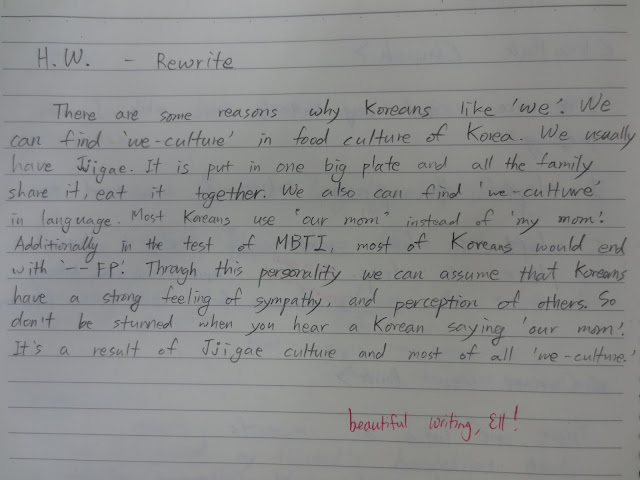“Oori,” Jin assured me, “is very important. Americans say “I--na--can do it” but Koreans say “Oori--we--can do it!”
I’ve been wanting to write this blog post for a little while now, but for one reason or another (Game of Thrones, Pinterest, killing mosquitoes in my shower) I hadn’t quite gotten to it before now. I don’t remember what Jin and I were talking about when this concept came up because, quite frankly, it relates to most things in Korean society. And then, when I was busy (watching Game of Thrones), Ell wrote this nice little paragraph about “We-Culture” making my own writing obsolete. Observe:
Jjigae, for the uncultured Americans in the crowd, is soup, although Ell could have written this about most foods in Korea. As I've blogged about before and as Ell so aptly alluded to here, food is communal. The MBTI is the Meyers-Briggs Personality Type Indicator test I forced all of my sophomore students to take. Something like 90% of our class were FP (feeling, rather than thinking, and perceiving, rather than judging), a personality type that lends itself well to cooperation and harmony. Sometimes it's enough to make a body think the entire Korean peninsula is full of Hufflepuffs. (There are worse things to fill the peninsula with; mosquitoes, for instance.)
The "We can do it!" mentality is great, sort of. It negates the necessity of thinking for oneself, unfortunately, and allows for a lot of unearned/misplaced trust as well as condemnation if a person doesn't naturally identify with the "we" others expect her to. On the other hand, every day I see my students helping one another, shockingly aware of others around them--and it's not because my students are moral superhumans (they aren't Joffrey, but neither are they Ned Stark). It's because of the "we" mentality.
Next up, the "keunyang" mentality, which is not nearly (I think) so positive.
 |
| Stationary, compliments of Thailand. |

Elaine, nothing could make your writing obsolete, short of using "thee" and "thou" too much.
ReplyDeleteSometimes our students write something that goes beyond communicating.
http://daddyrob.blogspot.kr/2002/12/kosin-universitys-advantage.html